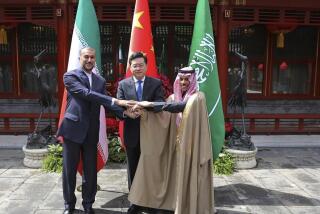China Reportedly Seals Afghan Border
- Share via
BEIJING — Fearing refugees and unrest on its western fringe, China has sealed off its tiny border with Afghanistan, a state-run newspaper reported here Wednesday.
The move, which took place Monday, followed similar action by Pakistan and Iran, other neighbors of Afghanistan that have closed off their borders to a growing tide of Afghan refugees fleeing famine, civil war and U.S.-led airstrikes in their homeland.
China’s border with Afghanistan spans only 47 miles and is little used, crossing through exceptionally inhospitable and mountainous terrain.
But the Chinese government decided to shut it down entirely, at least for now, after the United States began launching airstrikes Sunday against Afghanistan, the state-run China Daily reported Wednesday, quoting government spokesman Sun Yuxi. Foreign journalists have been barred from the area around the town of Taxkorgan in Xinjiang province, close to where China runs up against Afghanistan, Pakistan and Tajikistan.
Xinjiang is a sensitive place in the best of times, the home of a Muslim majority of Turkic-speaking Uighurs, many of whom chafe under Beijing’s rule. A small but tenacious band of separatists has waged a low-level campaign of violence within China for several years in pursuit of an independent state.
Hundreds, perhaps thousands, of Uighurs are believed to have gone into Pakistan and Afghanistan in recent years for training in extremist Islamic schools, some allegedly sponsored by the Taliban, the fundamentalist Afghan regime. Last month there were even rumors--quickly dismissed--that Osama bin Laden, the Saudi-born militant suspected of masterminding attacks against the United States, had crossed from Afghanistan into China.
Beijing is taking no chances, beefing up its troops in the area to guard against people coming from Afghanistan or any violence by local Muslims in sympathy with the attacks on the United States or in protest against the American response.
The Chinese government also said Wednesday that it opposes any broadening of the U.S. military retaliation to include other countries as targets, as has been suggested with regard to Iraq.
“Military actions against terrorism should be aimed at specific terrorist targets only and should not spread to or affect other countries or harm innocent civilians,” Foreign Minister Tang Jiaxuan told his British counterpart, Jack Straw, in a telephone conversation, according to the official New China News Agency.
Although Beijing is eager to appear as an ally in the war on terrorism, it is worried about increased instability in Central Asia and a growing American presence there.
But it also wants better relations with Washington. President Bush is scheduled to come to China on Oct. 20 for a meeting of the Asia-Pacific Economic Cooperation forum, a gathering whose focus has shifted from economics to anti-terrorism.
On Wednesday, Assistant Secretary of State James A. Kelly wrapped up a brief visit designed to pave the way for Bush’s trip.
“U.S.-China cooperation in the global struggle against terrorism is a top priority in the relationship, a point that the president will make clearly when he visits China,” Kelly said in a prepared statement.
More to Read
Sign up for Essential California
The most important California stories and recommendations in your inbox every morning.
You may occasionally receive promotional content from the Los Angeles Times.











